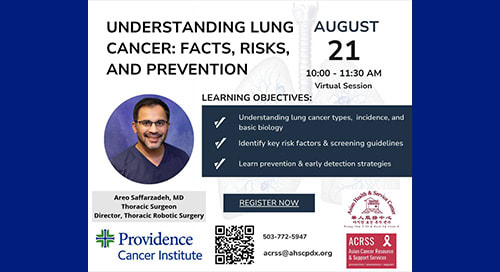Myasthenia gravis vs. ALS

[7 MIN READ]
In this article:
-
While myasthenia gravis (MG) and amyotrophic lateral sclerosis (ALS) have some similar symptoms, they are very different conditions from each other.
-
MG symptoms can lessen with rest, but ALS symptoms do not get better. Additionally, ALS is a terminal illness.
-
Learn some of the medications and supplements you should avoid if you are diagnosed with MG.
Myasthenia gravis vs. ALS: Symptoms, causes and treatment
Amyotrophic lateral sclerosis (ALS) and myasthenia gravis (MG) are both neurological conditions that share many of the same symptoms, including muscle weakness and difficulty swallowing. However, that’s where the similarities end.
“Because ALS and MG are neurologic disorders that affect people similarly, people often assume they are related,” says Tracy Bazan, M.D., a Providence neurologist who treats patients in Portland, Oregon. “The truth is, they are very different conditions that affect people differently. ALS is a terminal illness, while myasthenia gravis is treatable and can go into remission.”
Understanding myasthenia gravis and ALS
Myasthenia gravis is an autoimmune disease, which means it develops when the body’s immune system mistakes healthy cells for harmful pathogens and attacks them. It affects the neuromuscular junction, which is the synapse where a motor neuron’s nerve terminal connects with a muscle fiber.
ALS, sometimes called Lou Gehrig’s disease, is a neurodegenerative disease that affects the motor neurons in the peripheral and central nervous systems.
Symptoms: How do they compare?
ALS and myasthenia gravis symptoms appear similar because the muscles change and weaken in both conditions.
Shared symptoms of ALS and myasthenia gravis include:
- Muscle weakness
- Speech dysfunction
- Trouble swallowing
- Trouble breathing
- Difficulty chewing
Symptoms specific to a diagnosis of ALS include:
- Loss of muscle
- Muscle cramps
- Muscle weakness
ALS causes muscles to weaken over time, including respiratory muscles which can lead to trouble breathing.
Symptoms specific to MG include:
- Eyelid drooping
- Facial drooping
- Vision changes (blurry vision, double vision)
- Symptoms that fluctuate throughout the day
Causes and risk factors
The causes of MG and ALS are markedly different. As an autoimmune disorder, MG causes antibodies to block or destroy acetylcholine, which limits the brain’s ability to communicate with muscles. A problem with the thymus gland may also cause MG. This gland generally shrinks after puberty, but people with MG still have large thymus glands. Since the thymus gland still produces immune cells, researchers believe it sends the wrong message to immune cells and causes them to attack bodily tissue.
MG also has similar symptoms to multiple sclerosis (MS), which is another autoimmune disease. MS damages your myelin sheath, which protects your nerve fibers, and MG impacts your nerve and muscle cells.
Researchers are still trying to determine the cause of ALS. Gene mutations are thought to play a role in the development of the disorder. There is also some evidence that viral illness, physical trauma, poor diet and toxins could lead to ALS, but that has not been confirmed.
Because ALS and MG can appear similar, there is some overlap in the diagnosis process. Neurological exams are used as a baseline for both conditions. If your doctor suspects ALS or MG, some of the tests they may perform include:
- Blood tests to look for elevated levels of antibodies that cause MG
- Electromyography (EMG) to evaluate the function of the nerves and muscles
- Magnetic resonance imaging (MRI) to rule out other abnormalities, such as tumors
Why are MG and ALS sometimes confused?
There are a number of diseases that can mimic ALS, including Lyme disease, cervical myelopathy and vitamin B12 deficiency. But MG is perhaps the most common misdiagnosis — mainly because both conditions involve muscle weakness and fatigue.
“They can have similar symptoms at the onset,” says Dr. Bazan. “A person with ALS may also experience swallowing difficulties, slurred speech and shortness of breath at the beginning. The key difference is that with MG, these symptoms become better with rest. With ALS, they don’t improve.”
Treatment options for MG and ALS
The treatment for MG and ALS varies, so it’s important to receive an accurate diagnosis before beginning a treatment plan and in the early stages for both conditions, when possible. Early intervention is key to managing symptoms and can also help to slow disease progression.
How MG is treated
Several treatment options for myasthenia gravis can greatly improve the quality of life for those with the disease. In some cases, people with MG may go into remission and have no symptoms either permanently or temporarily.
Treatments for MG include:
- Acetylcholinesterase inhibitors to prevent the destruction of acetylcholine so communication between the brain and muscles is not impacted
- Immunosuppressants to help the immune system function properly so cells stop attacking acetylcholine receptors
- Plasmapheresis, a procedure that uses a machine to remove damaged antibodies out of blood plasma and replace them with healthy ones
- Thymectomy, which removes the thymus gland
“It can take a long time to find the right combination of meds that help control your symptoms,” says Dr. Bazan. “Within the immunosuppressant category, we’ve had more medications come on the market in the last few years that have provided additional options for people. Depending on how severe your disease is and the side effects you experience, it can take some time before you find a good balance.”
It’s also important for people with MG to adapt their lifestyles so they can combat potential MG triggers. For example, respiratory infections such as the cold, flu and pneumonia are common MG triggers. “During cold and flu season, I highly encourage all my patients to get their flu, COVID and age-appropriate pneumonia vaccines,” says Dr. Bazan.
How ALS is treated
ALS is a terminal disease, which means there is no cure. The typical life expectancy for those with ALS from the time of diagnosis is two to five years. However, there are ways to improve the quality of life for those living with ALS.
Treatments for ALS include:
- Medication to decrease neuron damage and slow down the progression of the disease; there are two medications approved by the Food and Drug Administration
- Physical therapy, which can help increase mobility
- Speech therapy to improve verbal communication
- Breathing support, including non-invasive ventilation, that helps support breathing through a mask when ALS starts to affect the respiratory muscles
The main treatment of ALS is caring for people through a multidisciplinary clinic that includes multiple ALS specialists, such as physical, occupational and speech therapists; respiratory therapists; a pulmonologist; a neurologist; a social worker; and palliative care.
While there is no cure, Dr. Bazan stresses the importance of symptom management for ALS. She also urges her patients and their families to take advantage of support groups for those in similar situations.
Medications and supplements to avoid with myasthenia gravis
There are several different medications and supplements that people with MG should avoid. Dr. Bazan gives each of her patients a list from the Myasthenia Gravis Foundation. That list includes:
- Certain antibiotics – “Prescribers need to be aware that certain classes of antibiotics can throw patients into a myasthenic crisis,” says Dr. Bazan.
- Magnesium – “I generally tell my patients to avoid magnesium supplements, unless there is a good reason they need to use them, such as to treat preeclampsia,” says Dr. Bazan.
- Beta-blockers – These medications can cause people with MG to feel sick.
The best way to find the right treatment for — and diagnosis of — both MG and ALS is to find a good neurologist. Contact your local Providence hospital to find a neurology provider who is right for you.
Contributing caregivers

Tracy Bazan, M.D., is a Providence neurologist who treats patients in Portland, Oregon.
Find a doctor
If you are looking for a primary care provider or a neurologist, you can search for one who’s right for you in our provider directory. Through Providence Express Care Virtual, you can access a full range of health care services.
Download the Providence app
It’s all in the app: easily stay connected with Providence and your health. With the Providence app, you can schedule appointments, have virtual visits from the comfort of your home, get personalized health recommendations, access your health records and so much more. Learn more and download the app.
Related resources
What to know about traumatic brain injury
Overwhelmed by medications? What you should know
This information is not intended as a substitute for professional medical care. Always follow your health care professional’s instructions.



